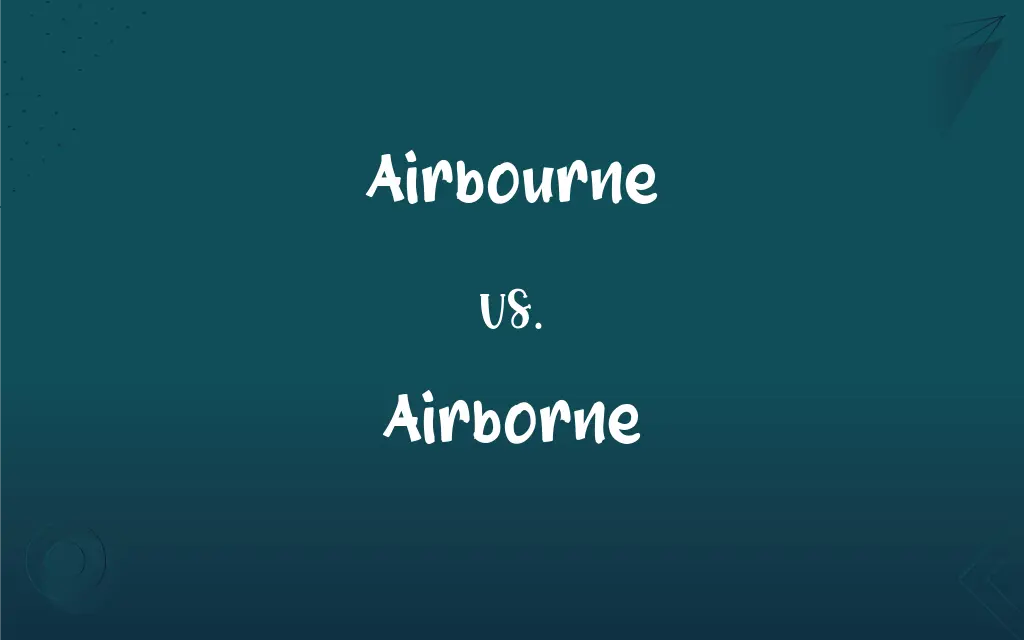Airbourne vs. Airborne: Mastering the Correct Spelling
Edited by Aimie Carlson || By Janet White || Updated on March 8, 2024
Airbourne is an incorrect spelling; the correct spelling is airborne. Airborne refers to something carried through or transported by the air.

Which is correct: Airbourne or Airborne
How to spell Airborne?

Airbourne is Incorrect

Airborne is Correct
ADVERTISEMENT
Key Differences
Break it down to 'air' (the atmosphere) + 'borne' (carried).
Associate 'borne' with 'transport,' as in transported by air.
Visualize something being 'born' into the air, hence 'airborne.'
Airborne combines 'air' and 'borne,' like 'born in the air.'
Remember 'borne' as in 'carried,' so things carried by air are airborne.
ADVERTISEMENT
Correct usage of Airborne
The virus is considered highly airbourne.
The virus is considered highly airborne.
He joined the Airbourne Division last year.
He joined the Airborne Division last year.
Pollutants can become airbourne and affect air quality.
Pollutants can become airborne and affect air quality.
Airborne is a term used to describe something that is carried through the air.
Plants can spread their seeds via airbourne methods.
Plants can spread their seeds via airborne methods.
Airborne Definitions
Suspended in the air.
Airborne particles are often invisible.
Conveyed by the air.
Pollen is often airborne.
Carried through the air.
The virus was airborne.
Transported by aircraft.
Airborne troops were deployed.
In flight or flying.
The drone became airborne quickly.
Carried by or through the air
Airborne pollen.
Transported in aircraft
Airborne troops.
In flight; flying
The plane is airborne.
In or carried by the air.
Airborne pollen can aggravate allergies.
In flight.
Fitted to an aircraft.
Airborne radar
Transported by air in an aircraft.
Airborne troops
Military infantry intended to be transported by air and delivered to the battlefield by parachute or helicopter.
Conveyed by or through air, as dust or pollen; as, a clean room is needed to avoid airborne contaminants.
In flight; flying; - said of an airplane.
Carried directly to the site of battle by aircraft; - said of combat troops, as, an airborne division.
Moved or conveyed by or through air
Airborne Sentences
The helicopter is airborne and on its way to the rescue site.
The disease spreads by airborne transmission.
The airborne virus quickly spread through the crowded room.
The pollen becomes airborne in the spring and causes allergies.
Soldiers in the airborne unit are trained for parachute jumps.
Airborne pollutants are a concern for environmental health.
He's fascinated by airborne sports like hang gliding.
Birds and insects are examples of airborne creatures.
Dust particles can easily become airborne during construction.
Airborne allergens can cause symptoms like sneezing and coughing.
Airborne troops played a crucial role in the operation.
Wildfires can send ash and debris airborne, affecting distant areas.
Airborne surveillance is used for border security.
Airborne operations require precise planning and execution.
The project aims to monitor airborne toxins in industrial areas.
Airborne cameras can provide valuable data for mapping.
Airborne particles from the fire affected air quality miles away.
Airborne divisions are known for their rapid deployment capabilities.
The airborne leaflets were used for psychological operations during the war.
They tested the air for airborne pathogens.
Keeping the virus from becoming airborne is essential in hospitals.
The plane was airborne within minutes of takeoff.
They study how seeds are dispersed by airborne methods.
During the parade, the airborne confetti created a festive atmosphere.
The scent of the flowers became airborne and filled the garden.
Airborne Idioms & Phrases
Go airborne
To suddenly lift off or become suspended in the air.
The car went airborne after hitting the ramp at high speed.
Catch something airborne
To contract a disease through the air.
It's easy to catch something airborne in crowded places.
Get airborne
To take off or begin to fly.
The pilot managed to get the plane airborne despite the bad weather.
Airborne operation
A military mission carried out by air, typically involving parachuting.
The airborne operation was crucial to taking the enemy by surprise.
Airborne patrol
A surveillance mission conducted by aircraft.
The coast guard uses airborne patrols to monitor maritime borders.
Airborne particles
Tiny solid or liquid particles suspended in the air.
Airborne particles from the volcano affected air quality for miles.
Airborne transmission
The spread of diseases through the air.
Hospitals have protocols to prevent airborne transmission of infections.
Airborne pollutants
Contaminants that are carried through the air.
Factories can release airborne pollutants that harm the environment.
Make something airborne
To launch something into the air.
The explosion made debris airborne, causing additional hazards.
Airborne division
A military unit trained for air assault operations.
He served in an airborne division known for its bravery.
Keep something airborne
To maintain flight or suspension in the air.
It takes skill to keep a kite airborne on a windless day.
Airborne surveillance
Monitoring from the air, often using aircraft or drones.
Airborne surveillance helps in gathering intelligence over large areas.
Airborne forces
Military troops specially trained to engage in air assault operations.
Airborne forces are often among the first to respond in a crisis.
FAQs
Why is it called airborne?
It's called airborne because it refers to being carried or transported by the air.
Which vowel is used before airborne?
The vowel 'e' is used in 'borne' in airborne.
What is the pronunciation of airborne?
Pronounced as /ˈer.bɔrn/ in American English.
What is the verb form of airborne?
There is no direct verb form; 'airborne' is an adjective.
Which preposition is used with airborne?
Commonly used prepositions include 'by' and 'in.'
What is the root word of airborne?
The root word is 'air' and 'borne,' from 'bear.'
Which article is used with airborne?
'The' is often used, as in 'the airborne particles.'
What is the plural form of airborne?
Airborne serves as its own plural form.
What is the singular form of airborne?
Airborne itself is both singular and plural.
Is airborne a noun or adjective?
Airborne is an adjective.
Is airborne a negative or positive word?
It's neutral, contextually dependent.
Is airborne a vowel or consonant?
The word consists of both vowels and consonants.
Is airborne a countable noun?
No, it's an adjective, not countable.
Is the airborne term a metaphor?
No, it's a literal term.
What is another term for airborne?
Air-transported, in flight.
What is the second form of airborne?
It doesn't change; remains airborne.
Which conjunction is used with airborne?
Conjunctions like 'and' and 'or' are commonly used.
Which determiner is used with airborne?
Determiners like 'the' or 'some' can be used.
How many syllables are in airborne?
Two syllables.
What is a stressed syllable in airborne?
The first syllable, 'air.'
What is the first form of airborne?
Airborne (as an adjective).
What is the third form of airborne?
There's no third form; it remains airborne.
Is airborne an adverb?
No, it's not an adverb.
How do we divide airborne into syllables?
Air-borne.
What part of speech is airborne?
It's an adjective.
What is the opposite of airborne?
Grounded, land-based.
Is airborne an abstract noun?
No, it's not a noun.
Is airborne a collective noun?
No, it's not a collective noun.
Is the word airborne imperative?
No, it's descriptive.
How is airborne used in a sentence?
"The researchers studied the movement of airborne pollutants."
About Author
Written by
Janet WhiteJanet White has been an esteemed writer and blogger for Difference Wiki. Holding a Master's degree in Science and Medical Journalism from the prestigious Boston University, she has consistently demonstrated her expertise and passion for her field. When she's not immersed in her work, Janet relishes her time exercising, delving into a good book, and cherishing moments with friends and family.
Edited by
Aimie CarlsonAimie Carlson, holding a master's degree in English literature, is a fervent English language enthusiast. She lends her writing talents to Difference Wiki, a prominent website that specializes in comparisons, offering readers insightful analyses that both captivate and inform.





























































